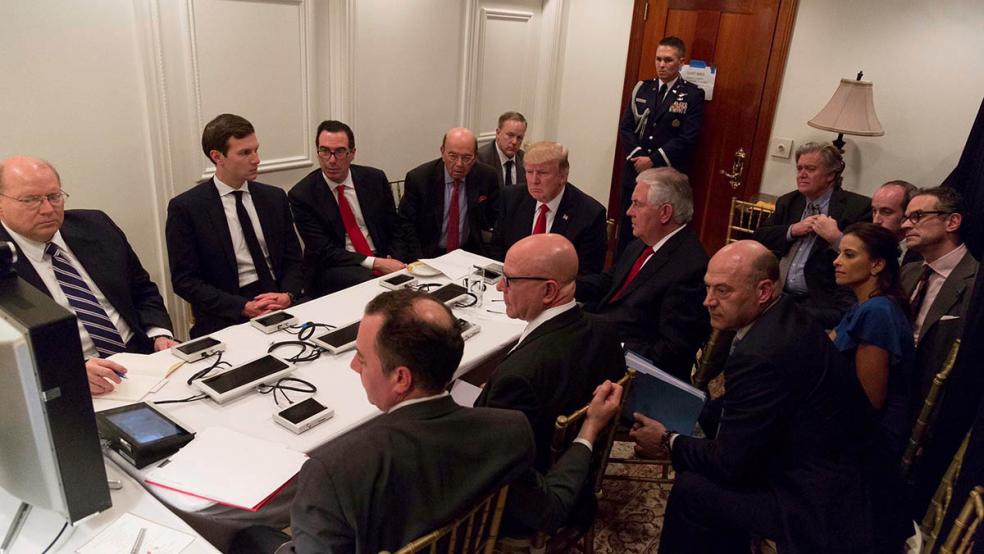In the wake of U.S. missile strikes against Syria, President Trump’s call for huge increase in defense spending is suddenly looking more likely to succeed.
Overnight, the new president was transformed into a war-time commander-in-chief, one who received widespread kudos for his action from lawmakers as diverse as House Minority Leader Nancy Pelosi (D-CA) and Senate Armed Services Committee Chair John McCain (R-AZ), both frequent critics of the president.
Related: America's Strike in Syria - The Generals Are Taking Charge
McCain, the most prominent defense hawk on Capitol Hill, on Friday praised Trump for standing up to Syrian President Bashar al-Assad and Russian President Vladimir Putin, a key Syrian ally.
“Peace through strength,” McCain said during an appearance on MSNBC’s Morning Joe program. “We’ve got to rebuild our military. It’s in terrible shape.”
If the Tomahawk cruise missile attack on the al-Shayrat airfield in Syria – launched in retaliation for the a chemical weapons attack this week that killed more than 80 civilians -- was the prelude to sustained military intervention in that civil-war torn county, Trump could wind up with the tens of billions of additional dollars he is requesting for defense – or even more.
“There’s no question historically that presidents who are involved in shooting wars find their defense budget hands strengthened,” said Gordon Adams, a defense spending expert. “There’s almost a one-to-one correlation historically. If you’re at war, your requests for defense budgets are generally approved with a speed that would blind you.”
Trump has ambitions to preside over a Reagan-era-style military buildup, and ordered Defense Secretary James Mattis to come up with a comprehensive plan to improve overall readiness in the armed services by fiscal 2019, including updating the nuclear arsenal and strengthening defenses against a possible nuclear attack by North Korea or Iran.
Related: Here's What Firing 59 Tomahawk Missiles at Syria's Airfield Cost
He is also calling for a major buildup of all four branches of the military, including more troops, jet fighters, ships and other weaponry.
Trump on March 16 formally asked Congress for $54 billion of additional defense spending in fiscal 2018 – a 10 percent increase -- by lifting a statutory cap on the Pentagon budget while cutting deeply into practically every government agency to offset the increased cost. While he has received pushback from a number of senior Republican and Democratic lawmakers on the scope of the cuts he is seeking in domestic programs -- especially at the Environmental Protection Agency (EPA), the State Department, Housing and Urban Development and National Institutes of Health -- Trump is likely to win most of the defense spending increases he is seeking for the fiscal year that begins Oct. 1.
Until now, however, his request for an additional $30 billion for defense in the current fiscal year and the offsetting cuts in domestic programs has generally been met with derision. There are only three weeks remaining before a continuing resolution expires and Congress could be faced with another partial government shutdown. Lawmakers in both parties are eager to finish up work on the fiscal 2017 appropriations without have to try to shoe-horn in extra defense spending and cuts to popular programs.
Now, however, it is far more likely that Trump could wind up with all the fresh defense dollars he wants if he decides to escalate U.S. military involvement in Syria. And if the country is suddenly put on war-time footing and (more) American troops are put in harm’s way, Congress may be open to rewriting the 2017 appropriations bill or accepting an emergency supplemental to meet Trump’s defense spending demands for this year.
Related: A Military Buildup and Big Tax Cuts: Is the Debt Set to Soar Under Trump?
Adams, a professor emeritus at American University, said a lot will depend on Trump’s next moves and how aggressive he becomes in challenging Russian and Iranian influence over the course of the Syrian civil war. “If we see more direct involvement in the civil war in Syria as a consequence, a repeated use of American Tomahawks and fighter aircraft, a decision to create or maintain some kind of a safe zone in northern Syria patrolled or policed by American military power, all of these things are steps down the road to deeper engagement.”
“And any deeper engagement that involves putting American men and women at risk and firing real things, strengthens the president’s hand when it comes to budget time,” he added. “It’s axiomatic, practically.”
Stan Collender, a budget expert and executive vice president of Qorvis MSLGROUP, thinks that it would take more than a single missile attack on a Syria air field to make Congress completely pliant on defense spending issues. Moreover, while Trump’s actions have generally been applauded, Sen. Rand Paul (R-KY) and a handful of other lawmakers complained that Trump launched the attack without consulting with Congress and must seek congressional authorization.
“If it’s a one-time activity, I don’t see it making much of a difference at all,” said Collender. “By the time Congress gets back in two weeks from recess, this will largely be forgotten. But if it continues in some form – if there’s another bombing strike, if there’s saber rattling and he wants to commit ground troops to it, then I could see there being some need by Congress to provide extra dollars for 2017.”





